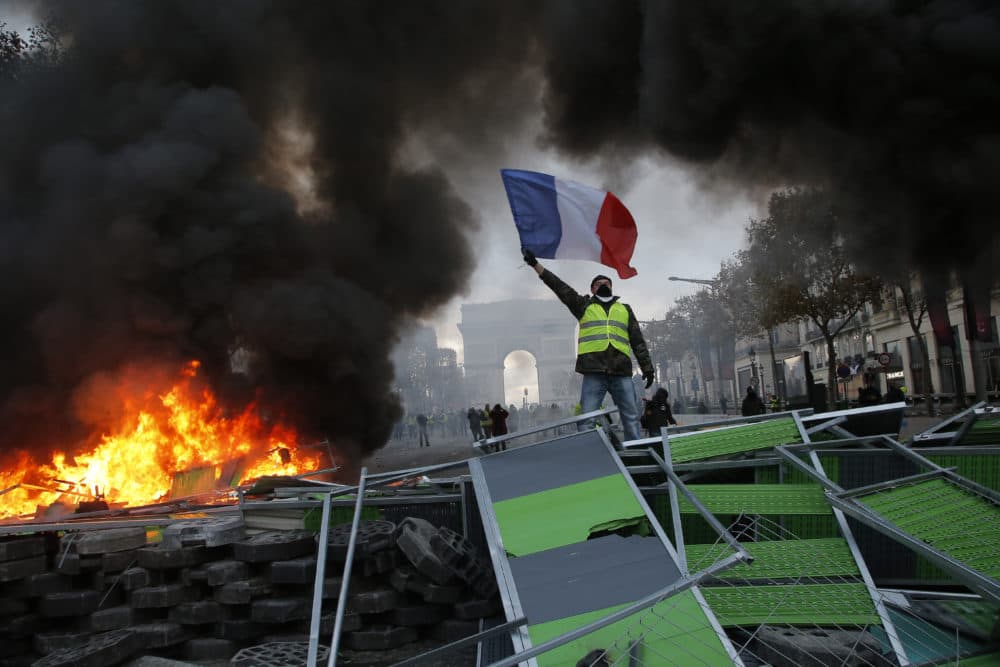Advertisement
Commentary
From France, A Cautionary Tale For Confronting Climate Change

In a pre-dawn tweet, Donald Trump complained that the demonstrations taking place in Paris are about matters other than his trade policies, but the protesters there are concerned with weightier issues. Politicians in this country should be paying attention to the dialogue now going on between the people of France and their government.
Hundreds of thousands have demonstrated this month across the country in response to higher taxes on transportation fuels. The government of President Emmanuel Macron is implementing a plan to raise taxes on gasoline and diesel fuel as part of a comprehensive program to reduce carbon emissions and fight climate change. (Unlike the U.S., France has a cabinet-level ministry tasked with steering the transition to renewable energy.)
The latest fuel tax hike led to the formation of the gilets jaunes, an unaligned grassroots protest movement, organized on social media. (The name translates to “yellow vests” and refers to the high-visibility safety vests motorists are required to keep in cars and which the movement has adopted as a symbol of solidarity.) Their politics is ostensibly neither left nor right, although radicals on both sides of the political spectrum have been accused of trying to co-opt the campaign.
There are already signs that politicians in this country are aware that climate solutions will need to be socially equitable.
The movement has evolved from a tax revolt into a broad mobilization in opposition to ruling elites who are perceived to be detached from the financial stress on everyday people. Still, the national plan to wean the country from fossil fuels remains one of the fundamental issues at hand.
According to a recent communiqué, the gilets jaunes recognize the urgency of addressing climate change, but they demand that the climate crisis not be exploited as a means to collect more taxes. They want the government to spend revenue collected for climate mitigation in a manner that stimulates the economy and creates jobs. Their demands now include a rollback of recent tax increases and the formation of a “citizens assembly” to debate the parameters of the energy transition.
In response to the protests, which have become violent, Macron is calling for a new high-level climate council and a “social pact” to guide the implementation of the nation’s energy policies. While staying the course on climate, he recognizes the need to win the support of the middle class and the working class for his policies.
So there’s an impassioned national conversation underway about addressing climate change, with the emphasis on economic justice. And although a majority still favor prioritizing the preservation of their purchasing power over expediting the transition to renewable energy, polls indicate that climate change is on the rise as a political priority.
The climate debate in France is not about whether the government should implement robust mitigation measures; rather, it’s about how to ensure that the costs of the transition to a green economy are shared equitably. The current protests provide lessons for the United States, which will sooner or later face the same issues.
With a Democratic majority in Congress in January, climate change is finally on our national agenda again. Although nobody expects major national climate legislation under the current administration, the groundwork for future climate initiatives will be laid in the coming months. Lawmakers will want to avoid the problems that Macron now faces.
The costs -- and benefits -- of a green economy must be shared by all.
For example, Macron’s policies alienated people in rural and semi-rural areas whose transportation options are far more limited than those of city dwellers. Taxing carbon-based fuels without providing transportation alternatives has a negligible effect on emissions and serves to generate political resentment. Unless special provisions were included, a national carbon tax in this country would be met with political results similar to those seen in France, especially in rural America where the Democratic party currently struggles to find votes.
There are already signs that politicians in this country are aware that climate solutions will need to be socially equitable. The “Green New Deal,” a broad initiative advocated by Alexandria Ocasio-Cortez, New York's congresswoman-elect, echoes some of the demands of the gilets jaunes for economic justice in the energy transition. In addition to decarbonizing the economy, the Green New Deal aspires to create jobs, address income inequality, provide a basic income, and reinvigorate labor unions.
So even while our federal government dismisses the urgent warnings of its own science agencies, other nations are already grappling with the implementation of aggressive climate mitigation policies. What we can learn from the protests in France is that government programs to address climate change will encounter fierce political resistance from any group that perceives itself to be unfairly burdened. The costs — and benefits — of a green economy must be shared by all.
